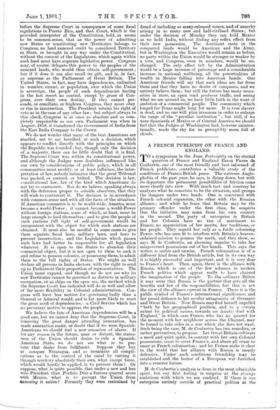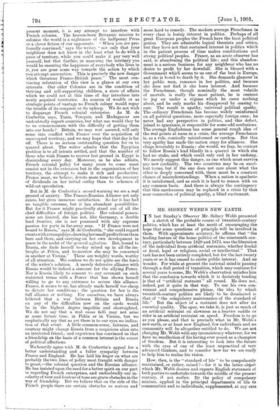A FRENCH PUBLICIST ON FRANCE AND • ENGLAND T O a
symposium in the June Fortnightly on the eternal question of France and England Baron Pierre de Conbertin, one of the most friendly and best informed of French publicists, contributes a valuable study Of the conditions of Franco-British peace. The extreme A nglo- phobia of the past year, he says, is dying down, but with its departure the permanent possibilities of friction come more clearly into view. With much tact and courtesy he analyses what he conceives to be the situation, and groups the dangers under two heads. One is concerned with French colonial expansion, the other with the Russian alliance ; and while he fears that Britain 'may be the primary offender under the first class, he suspects that the initiative may come from his own cotintry in the second. The party of enterprise in 'Britain and her Colonies - have no ties of sentiment to France, no appreciation of her merits,- her traditions; or her people. They regard her only as a futile colonising Power, who has seen fit to interfere with Britain's heaven- ordained mission to possess the earth, 'and they show," so says M. de Coubertin, an alarming impulse to take -her misgoverned possessions out of her hands. This, says the writer, is unfair and unwise. French colonisation is OP a different End from the British article, limit in its own Way it is highly successful and important, and it is very' dear to France's heart. Then, again, there is the alliance with Russia, which is one of the few schemes in modern French politics which appear really to have chained the imagination of the people. To the ordinary -Briten it may seem that Russia is the partner that gets all- the benefits and few of the responsibilities, but this 'is not the view of the alliance current in France. There it is the public. symbol of France's international significance, and. her proud defiance to her secular antagonists• of Germany and Great Britain. Now Russia may find herself impelled. "both by her geographical position, and to a certain extent by political causes, towards an Asiatic duel With England," in which case France, who has no quarrel for the moment with her neighbour across the Channel, may be forced to take sides in a war which she does not want. Such being the case, 31: de Coubertin has two remedies, Or rather preventives, to propose. Let Great Britain cultivate a meek and quiet spirit, be content with her ()Vim Colonial possessions, cease to covet Franee's, and above all cease' to sneer at French colonisation ; and let France make it clear to the world that her alliance with Russia is merely defensive. Under such conditions friendship may be established and the horror of a European war banished into a remoter future.
M. de Coubertin's analysis is .done in. the most admirable spirit, but -our first feeling is :surprise at, the strange ambitions with whiOh we- are credited. If there is one enterprise entirely outside of practical politics at the present moment, it is any attempt to interfere with French colonies. The heaven-born Britannic mission to colonise the world is a nightmare of the halfpenny Press or a clever fiction of our opponents. "When you are pro- foundly convinced," says the writer, "not only that your neighbour does not know in the least what to do with a piece of territory, while you could make it pay very well yourself, but that further, in annexing the territory you would be ensuring the happiness of everybody who lives in it, you are gone some way towards the action by winch you attempt annexation. This is precisely the new danger which threatens Franco-British peace." The most con- vincing refutation of this view is a glance at our own interests. Our older Colonies are in the condition of thriving and self-supporting children, a state of affairs which we could not at this time of day introduce into newly acquired territories. As sources of wealth or as strategic points of vantage no French colony would repay the trouble of its conquest or its upkeep. We do not wish to disparage French colonial enterprise. As M. de Coubertin says, Tunis, Tonquin, and Madagascar are undoubtedly superb countries, but what use would they be to us commensurate with the difficulty of getting them into our hands ? Britain, we may rest assured, will only come into conflict with France over the acquisition of unoccupied territory, and we may hope that that day is far off. There is no serious outstanding question for us to quarrel about. The writer admits that the Egyptian problem is to all intents settled, and that the number of those who wish France to recover lost ground in Egypt is diminishing every day. Moreover, as he also admits, French colonial policy for many years to come must consist not in the extension but in the organisation of her territory, the attempt to make it rich and productive. France must, we believe, devote more time to the recovery of dividends on her initial outlay than to schemes Of wild-cat speculation.
But in M. de Coubertin's second warning we see a real ground of anxiety. The Franco-Russian Alliance not only exists, but gives immense satisfaction. So far it has had no tangible outcome, but it has abundant possibilities. But for it France might practically stand out of all the chief difficulties of foreign politics. Her colonial posses- sions are limited, she has not, like Germany, a double land frontier, she is not possessed with any supreme passion for ports in far-away seas. "If France were not bound to Russia," says M. de Coubertin, "she could regard events with a tranquil eye, drawing her small profits from them here and there, and carrying on her own development in peace in the midst of the general agitation. But, bound to Russia, she finds herself to-day mixed up in all the im- broglio at Pekin, and to-morrow she may be concerned in another at Vienna." These are weighty words, worthy of all attention. We confess we do not quite see the force of the writer's solution. A merely defensive alliance with Russia would be indeed a sinecure for the allying Power. Nor is Russia likely to consent to any covenant on such restricted terms with a Power that has shown herself willing to go to any extremes to secure this alliance France, it seems to us, has already made herself too cheap to dictate her conditions ; the question for her is the full alliance or nothing. For ourselves, we have always believed that a war between Britain and Russia, on any of the difficulties now on the cards would be in the highest degree impolitic and shortsighted, We do not say that a real casus belli may not arise at some future time, in Pekin or in Vienna, but we emphatically say that as yet there is to our eyes no indica- tion of that event. A little common-sense, fairness, and courtesy might change Russia from a suspicious alien into an interested friend ; and experience has convinced us that a friendship on the basis of a common interest is the surest of political affections.
We heartily agree with M. de Coubertin's appeal for a better understanding and a fuller sympathy between France and England. He has laid his finger on what are probably the two lines of policy most fraught with danger to peace,—the colonial question and the Russian alliance. He has insisted upon the need for a better spirit on our part in regarding French enterprises, and undoubtedly our in- sularity of view and hauteur of tone are grave obstacles in the way of friendship. But we believe that on the side of the French people there are certain obstacles as serious and more hard to remedy. The modem average Frenchman in every class is losing interest in politics. Perhaps of all great European peoples the French have the least political genius. They are admirable logical theorists and critics, but they have not that sustained interest in politics which in the patient process of time makes constitutions and strong political peoples. France, as an acute observer has said, is abandoning the political life ; and this abandon- ment is a serious business for any neighbour who has no desire to profit by her downfall. She is blessed with a Government which seems to us one of the best in Europe, and she is bored to death by it. She demands glamour in her public men, romance in her politics, and because she does not find it she loses interest. And because the Frenchman, though nominally the most volatile of mortals, is really the most patient, he is content to jog on under a regime which he cares nothing about, and he only marks his disapproval by ceasing to care. The result is apathy, universal political apathy. The ordinary Frenchman has become widely uninformed on all political questions, more especially foreign ones ; he never had any perspective in politics, and this defect, joined to ignorance, is responsible for some odd confusions. The average Englishman has some general rough idea of the real points at issue in a crisis, the average Frenchman is, as a rule, comically misinformed or careless. But this " very apathy has made the nation crazy for alliances. She clings feverishly to Russia : she would, we fear, be content to follow Russia's lead blindly in a quarrel in which she had no stake, and. which could only end in her undoing. We merely suggest this danger, as one which must survive any new cordiality. The two countries may be on excel- lent terms, but if the one does not care about what the other is deeply concerned with, there must be a constant chance of misunderstandings. When a nation is apathetic it is uninformed, and as such it is hard to reason with on any common basis. And there is always the contingency that this carelessness may be replaced in a crisis by that near connection of political apathy, a blind excitement.







































 Previous page
Previous page